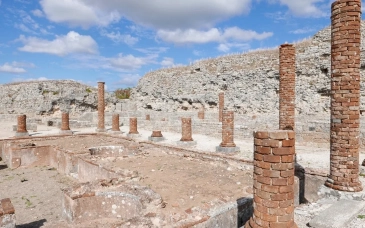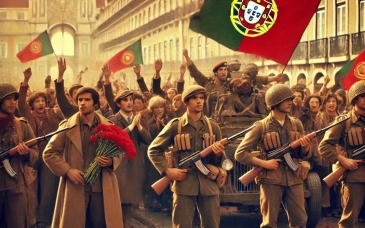The relationship between church and state in Portugal has been a complex and dynamic one, shaped by centuries of religious influence, political upheaval, and social transformation. From the early establishment of Christianity in the Iberian Peninsula to the authoritarian Estado Novo regime and the democratic transition following the Carnation Revolution, church-state relations in Portugal have undergone significant changes. In modern Portugal, the legacy of these historical dynamics informs the current model of secular governance that respects religious freedom while maintaining a clear separation between religious institutions and the state.
This article examines the evolution of church-state relations in Portugal, focusing on key historical developments and their impact on modern Portuguese society. It explores the establishment of Catholicism as the dominant religion, the anti-clericalism of the First Republic, the symbiotic relationship during the Estado Novo, and the establishment of religious freedom following the 1974 Carnation Revolution. Through this historical lens, we can better understand the current legal framework and social attitudes toward religion in Portugal.
Catholicism’s Deep Roots in Portuguese Society
The Early Spread of Christianity
Christianity arrived in the Iberian Peninsula in the first centuries of the Common Era, and by the time of the Visigothic Kingdom in the 6th century, Catholicism had become the dominant religion. Following the Islamic conquest of Iberia, the Christian Reconquista sought to reclaim the peninsula, culminating in the establishment of the Kingdom of Portugal in 1139. The Reconquista and subsequent Portuguese monarchy established Catholicism as a central part of Portuguese identity and governance. By the 13th century, Catholicism was deeply integrated into both Portuguese society and the state.
Throughout the medieval period, the Catholic Church wielded significant influence over Portuguese politics, culture, and education. Portuguese monarchs often collaborated closely with the Church, and religious institutions enjoyed privileges and land grants. The papacy granted Portugal’s kings the title “Most Faithful King” (Rex Fidelissimus), further solidifying the special relationship between the Portuguese Crown and the Vatican. The Church’s role in Portuguese society was strengthened by the Age of Exploration, as Portuguese missionaries spread Christianity to Africa, Asia, and the Americas.
The Inquisition and Religious Uniformity
The Portuguese Inquisition, established in 1536, exemplifies the deep ties between the Portuguese state and the Catholic Church. Operating under the control of the Portuguese monarchy with papal approval, the Inquisition targeted perceived heretics, particularly Jewish converts to Christianity (conversos), accused of secretly practicing Judaism. The Inquisition wielded broad powers, enforcing religious uniformity and reinforcing Catholicism’s dominance in Portuguese society. The consequences of this era were far-reaching, with minority religious groups either expelled or forced into secrecy, and the Catholic Church retaining its central role in Portuguese life.
Anti-Clericalism and the First Republic (1910–1926)
The Fall of the Monarchy and the Rise of Secularism
The end of the Portuguese monarchy in 1910 and the establishment of the First Republic marked a significant shift in church-state relations. The new republican government was staunchly anti-clerical and sought to reduce the influence of the Catholic Church. Republican leaders viewed the Church as a symbol of the monarchy’s outdated and oppressive social order, and thus targeted it as part of a broader effort to modernize Portugal and align it with European secular and democratic ideals.
Anti-Clerical Policies of the First Republic
The First Republic enacted several anti-clerical policies, including the separation of church and state, the secularization of education, and the confiscation of church property. Religious orders were expelled, and public expressions of religion were restricted. The Constitution of 1911 enshrined these principles, declaring Portugal a secular state and prohibiting the state from endorsing any religion. This anti-clerical stance was among the most radical in Europe at the time, and it generated significant resistance from Catholics and clergy.
The Catholic Church faced considerable challenges during this period, as religious practices and institutions were suppressed. Many Catholics felt alienated from the First Republic, and the Church lost much of its social and political influence. The anti-clerical policies contributed to social unrest and alienated the Church from the republican government, which faced political instability throughout its short-lived existence.
The Estado Novo and the Re-Establishment of Church Privileges
Salazar and the Catholic Church
The authoritarian Estado Novo regime, established by António de Oliveira Salazar in 1933, reversed the anti-clericalism of the First Republic and re-established a close relationship between the state and the Catholic Church. Salazar, a devout Catholic, saw the Church as an essential ally in promoting the values of order, hierarchy, and morality that underpinned his regime. His vision for Portugal emphasized conservative social values, with a strong focus on family, tradition, and obedience to authority.
The Estado Novo viewed the Catholic Church as a source of social stability and moral authority, making it a key partner in Salazar’s regime. The regime restored many of the Church’s privileges, allowing religious instruction in schools, returning confiscated property, and providing state subsidies to religious institutions. The Catholic Church, in turn, generally supported the Estado Novo’s policies and benefited from its alignment with the state.
The Concordat of 1940
In 1940, the Estado Novo signed a Concordat with the Vatican, formalizing the Church’s privileged status in Portugal. This agreement granted the Catholic Church special rights and recognized its role in Portuguese society. Under the Concordat, the Church gained control over religious education, marriage, and social services. The Concordat also guaranteed that Catholicism would have a prominent place in Portuguese public life, and it protected the Church from state interference.
The 1940 Concordat solidified the symbiotic relationship between the Church and the Estado Novo, with each institution reinforcing the other’s authority. Catholicism became closely associated with Portuguese nationalism, and the state actively promoted religious ceremonies and symbols. The regime’s motto, “God, Fatherland, and Family,” encapsulated this vision, using Catholic values to legitimize Salazar’s authoritarian rule.
Dissent and Social Change
Despite the Church’s official support for the Estado Novo, some Catholics grew increasingly critical of the regime’s authoritarianism and colonial policies, particularly in the 1960s and 1970s. Influenced by the Second Vatican Council (1962–1965), which emphasized human rights, social justice, and the dignity of all people, a new generation of Portuguese Catholics began advocating for social reforms. Priests, particularly those working with the poor and marginalized, voiced opposition to the Estado Novo’s repressive policies and lack of political freedom.
This growing dissent within the Church contributed to the regime’s eventual decline, as clergy and laypeople alike began to call for change. The Catholic Church’s shift toward social justice laid the groundwork for its eventual support of the democratic transition that would follow the Carnation Revolution.
The Carnation Revolution and the Establishment of Religious Freedom
The Carnation Revolution and Secularization
On April 25, 1974, the Carnation Revolution, a peaceful military-led coup, overthrew the Estado Novo regime and initiated Portugal’s transition to democracy. The revolution marked a turning point in church-state relations, as the new government sought to establish a secular, pluralistic society. The 1976 Constitution, adopted in the wake of the revolution, enshrined religious freedom, guaranteed the separation of church and state, and ensured equal treatment of all religions under the law.
The Catholic Church, while not directly involved in the revolution, welcomed the transition to democracy and adapted to the new secular framework. Many Catholics who had opposed the Estado Novo embraced the democratic principles of the new republic, which included freedom of conscience and respect for human rights. The Church supported efforts to promote social justice, equality, and solidarity, aligning itself with the democratic values that emerged after the revolution.
The 1976 Constitution and Legal Protections for Religious Freedom
The 1976 Constitution enshrined religious freedom and established the separation of church and state as foundational principles of the new Portuguese Republic. Article 41 of the Constitution guarantees freedom of conscience, religion, and worship, and prohibits discrimination based on religion. It also ensures the right of individuals and religious communities to practice their faith freely, whether individually or collectively, in public or in private.
Under the 1976 Constitution, religious institutions were no longer granted preferential treatment, and religious instruction in public schools became optional. The state adopted a neutral stance on religious matters, affirming its commitment to secularism and equality. This legal framework created a pluralistic environment in which diverse religious communities could coexist and flourish.
The Modern Era: Church and State Relations in a Secular Society
The 2001 Religious Freedom Act
In 2001, Portugal further strengthened its commitment to religious freedom with the passage of the Religious Freedom Act. This law established a legal framework for the registration and recognition of religious communities and granted them specific rights, including tax exemptions, the right to perform marriages, and the ability to establish educational institutions. The Religious Freedom Act also created the Commission for Religious Freedom, an independent body tasked with promoting religious tolerance and ensuring that religious rights are respected.
While the Catholic Church retained its influence as the dominant religion in Portugal, the Religious Freedom Act underscored the government’s commitment to equal treatment of all religions. This legislation marked an important step in promoting religious pluralism and protecting the rights of minority religious groups, including Protestant, Jewish, Muslim, Hindu, and Buddhist communities.
Catholicism in Modern Portuguese Society
Although Portugal is officially a secular state, the Catholic Church remains an influential cultural and social institution. Around 80% of Portuguese citizens identify as Catholic, and the Church continues to play an important role in Portuguese life, particularly in areas of social welfare, education, and healthcare. Catholic organizations provide essential services to vulnerable populations, and the Church remains a respected voice on moral and ethical issues.
The Catholic Church in Portugal has adapted to its new role as an independent institution in a pluralistic society. It actively participates in public debates on topics such as family values, social justice, and human rights, while respecting the secular framework established by the state. The Church has also engaged in interfaith dialogue, promoting mutual respect and understanding among different religious communities.
Challenges and the Path Forward
While Portugal’s secular model has been successful in promoting religious freedom and inclusivity, challenges remain. Debates over issues such as abortion, same-sex marriage, and euthanasia have highlighted tensions between Catholic teachings and secular values. The Catholic Church has expressed opposition to some of these policies, advocating for the protection of life and family values. However, it has also respected the democratic process and worked within the secular framework to voice its concerns.
As Portugal continues to evolve as a diverse and pluralistic society, the relationship between church and state will likely remain an area of discussion and negotiation. The Catholic Church, as the country’s largest religious institution, will continue to play a significant role in Portuguese society, balancing its commitment to its teachings with respect for Portugal’s secular and democratic principles.
The Legacy of Church and State Relations in Modern Portugal
The history of church-state relations in Portugal reflects a journey from close alliance to confrontation, and ultimately to a model of peaceful coexistence and mutual respect. From the anti-clericalism of the First Republic to the Estado Novo’s alignment with Catholicism, and finally to the secular framework established after the Carnation Revolution, Portugal has navigated a complex relationship between religion and politics.
Today, Portugal’s commitment to secularism and religious freedom has created a society in which diverse religious communities can coexist and contribute to the nation’s social and cultural life. The Catholic Church, while no longer holding a privileged status, continues to play an important role in Portuguese society, advocating for values of compassion, justice, and human dignity. The Portuguese model demonstrates that a secular state can uphold religious freedom and allow religious institutions to thrive, promoting a pluralistic society where all citizens are free to practice their faith or beliefs without interference from the state.

